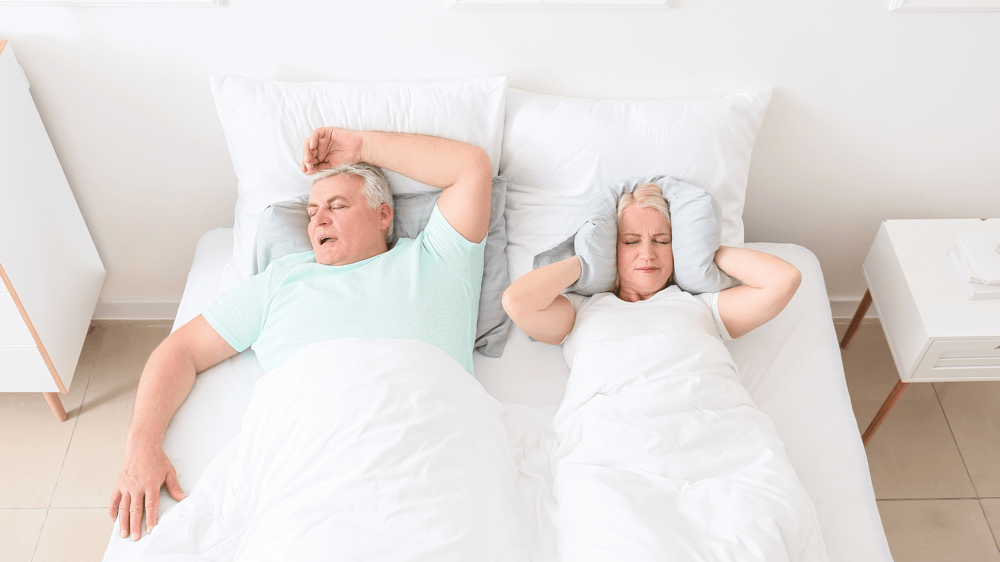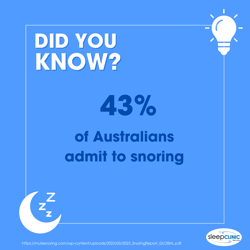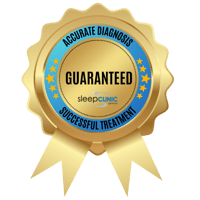The Ultimate Guide to Snoring: Hidden Consequences and Effective Solutions

Do you snore? If so, you may think it's just a harmless noise that can be a nuisance to your partner. But, did you know there might be hidden consequences of snoring that you're not even aware of?

Snoring doesn't just affect your sleep; it interrupts your partner's rest too, and can put additional strain on your relationship. In fact, 22% of Australians argue about snoring three or more times per month¹.
Snoring can also be a ‘red flag’ indicator of a more serious issue - sleep apnea, where breathing stops while asleep. If left untreated, sleep apnea can lead to significant health problems like high blood pressure, heart disease, and even stroke.
In this article, we‘ll take a closer look at the potential - and dangerous - impacts of snoring, as well as effective solutions to help you rediscover peaceful sleep.
How Does Snoring Affect Your Sleep Quality?
When you snore, the muscles in your throat relax and narrow, causing the airway to become narrower. This leads to the familiar snoring sound - essentially, it's the sound of air struggling through your upper airway.
Snoring causes brief wake-ups throughout the night because it disrupts your breathing, even if you're not conscious of it. Your body's natural response to this interruption in breathing pattern is to briefly wake you up, ensuring you keep breathing properly.
These interruptions prevent deep, restful sleep leaving you dealing with fatigue and excessive daytime sleepiness, which impacts on your ability to concentrate, focus, and perform at your best.
To improve sleep quality and reduce the negative effects of snoring, it’s important to know exactly what’s causing it. By doing this, you can enhance your overall well-being and get back to living life to its full.
What Health Risks Are Associated with Chronic Snoring?
Even if your snoring seems harmless, it’s never a good thing.
Snoring is a major red flag for sleep apnea. Persistent loud snoring is the number one symptom of obstructive sleep apnea (OSA) - which affects 1 in 5 Australians.
Sleep apnea poses significant health risks, especially concerning your cardiovascular system. Here's why:
High Blood Pressure:
Sleep apnea, with its recurring breathing interruptions, strains your cardiovascular system, raising your blood pressure. Over time, this stress can lead to hypertension, increasing your risk of heart disease and stroke.
Cardiac Health Impact:
Oxygen deprivation puts additional pressure on your heart, forcing it to work harder to circulate blood. This can lead to heart conditions like arrhythmias and even heart failure.
Diabetes Risk:
Sleep apnea's disrupted sleep patterns and reduced oxygen levels can also affect your body's ability to regulate blood sugar levels, potentially leading to insulin resistance and the onset of type 2 diabetes.
It's crucial to be aware of health risks associated with chronic snoring so that you can get the help you need.
Remember: early intervention is key - if you think you might be at risk for OSA, you can take our quick (and free) online assessment here.
How Does Snoring Affect My Relationships?
What’s often overlooked is the ripple effect snoring has on your personal life - snoring and insufficient sleep can have a huge impact on your emotional well-being and relationships.
Your snoring can disrupt your partner’s sleep, which can even lead to the need for separate bedrooms - with 36% of people turning to this as a solution. Lack of quality sleep can make both of you irritable and moody, sparking conflicts and reducing physical and emotional intimacy.
Plus, constant sleep disruption and frustration can make you or your partner feel unheard, leading to resentment - creating a rift that can become hard to repair.
That's why addressing snoring early on is so important. Seeking treatment and finding effective strategies not only improves your sleep but can also strengthen the bond between you and your partner.
How Is Snoring Connected to Sleep Apnea?
As mentioned earlier, snoring is often a sign of sleep apnea. Sleep apnea involves frequent interruptions in breathing during sleep, known as apneas, which can last from a few seconds to a minute and can happen several times a night.
There are three main types of sleep apnea:
- Obstructive sleep apnea: this occurs when the throat muscles fail to keep the airway open
- Central sleep apnea: which occurs when the brain doesn't send the right signals to the breathing muscles
- Complex sleep apnea: a combination of both obstructive and central sleep apnea
If you think you might have sleep apnea, don’t hesitate to consult a healthcare professional. They can refer you for a sleep study to monitor your breathing patterns and recommend the best treatment for you.
And, getting a sleep study doesn’t have to be a big deal anymore. At Sleep Clinic Services, we provide hassle-free at-home sleep studies, eliminating the need for testing in unfamiliar lab settings. We prioritise your comfort and convenience while delivering professional care you can trust.
How Can I Stop Snoring
If your snoring is not caused by an underlying medical condition, here are some tips that might help you:
Maintain a healthy weight: Excess weight can contribute to snoring by putting pressure on the airways. In Australia overweight people are nearly twice as likely to be snorers (57%) than those who are a healthy weight (29%).
Sleep on your side: Ever noticed that snoring gets worse when you're on your back? That's because your tongue and throat tissues can block your airway. Try sleeping on your side instead.
Elevate your head: Adding an extra pillow or using a wedge-shaped one can lift your head a bit. This simple trick can help open up your airway.
Avoid alcohol and sedatives: That nightcap might seem relaxing, but it also relaxes your throat muscles, leading to more snoring.
Keep nasal passages clear: Sometimes snoring is thanks to nasal congestion. Simple remedies like saline nasal sprays can help clear your passages.
What Lifestyle Changes Can Help Prevent Snoring?
Making a few lifestyle changes can significantly ease snoring and improve your sleep:
Kick the smoking habit: Smoking can irritate your throat tissues, worsening snoring.
Beat allergies: Dust mites, pet dander, and pollen can clog your nasal passages, leading to snoring. Using allergy-proof bedding and air filters to minimise exposure to these allergens can help.
Practice good sleep hygiene: Set a consistent sleep schedule, create a comfortable sleep environment, and avoid stimulating activities before bedtime.
Manage Stress: Stress tenses your muscles, increasing the likelihood of snoring. Try some stress-relieving activities like exercise, meditation, or deep breathing exercises.
What Medical Treatments Are Available for Snoring?
If you've tried lifestyle changes, experimented with different sleep positions, and your snoring still persists… Don't worry, there are medical treatments that can help. Options include:
- Continuous Positive Airway Pressure (CPAP): This is the gold standard treatment for sleep apnea, and it is extremely effective for snoring too. Gently pressurised air is introduced to your airway, acting as an 'air splint' to hold the upper airway open. This air pressure eliminates the snoring sound completely.
- Oral appliances: These are custom-made devices that are worn in the mouth during sleep. They snugly fit in your mouth, repositioning your jaw and tongue to keep your airway open.
- Surgery: When there are structural issues causing obstruction in your airway, surgery might be recommended. Procedures like uvulopalatopharyngoplasty (UPPP), tonsillectomy, or adenoidectomy can be options worth considering.
What Snoring Devices and Aids Can Help Stop Snoring?
There are also various snoring devices and aids available that can help reduce snoring:
- Nasal dilators: Small devices that are inserted into the nostrils to help keep them open for better airflow. These are especially helpful if you have issues like nasal congestion or a deviated septum.
- Snoring mouthpieces: Oral devices which are worn in the mouth during sleep. These work by adjusting your jaw and tongue position to maintain an open airway.
- Chin Straps: Comfortable bands that encircle your head and chin, encouraging closed-mouth breathing. The result? Reduced snoring as you breathe through your nose.
Final Thoughts for Better Sleep
From feeling constantly tired, to serious health risks like sleep apnea, snoring is more than just noise - and it shouldn’t be ignored.
Understanding its potential impacts and taking action is key. Whether through a sleep study, lifestyle changes, or snoring aids… solutions exist! Start your journey towards better sleep, improved health, and stronger relationships. You and your loved ones deserve it.
If you’re worried about your snoring - get in touch today for an obligation free chat with one of our friendly Care Coordinators, or schedule a call and we will call back at a time you choose.
1. https://mutesnoring.com/wp-content/uploads/2023/03/2023_SnoringReport_GLOBAL.pdf

What's it like getting a sleep study with Sleep Clinic Services?


















Care you can trust. For over a decade, Australia's best provider.

Get in touch
Are you ready to reclaim peaceful restorative sleep?
Wherever you are, we can help.
As Australia's leading provider of telehealth screening, diagnosis and solutions for 'sleep disordered breathing' sufferers, we care for people all around Australia.
Questions?
Call during business hours or fill in the form and we'll call you back at the time you choose. No cost, no obligation.


